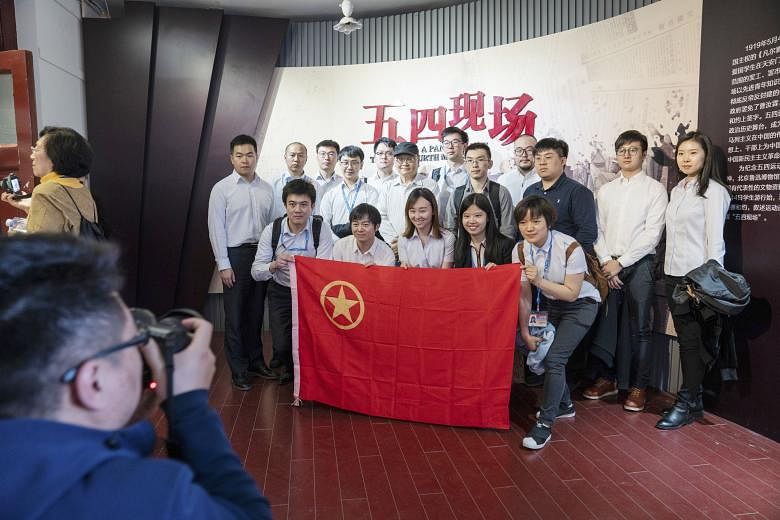Fresh from a week of intensive diplomacy, President Xi Jinping turned his attention yesterday to public relations of another kind - galvanising China's young people.
For an hour at the Great Hall of the People, he commemorated the centenary of the student-led May Fourth Movement by attempting to whip up patriotic fervour among his young crowd, urging them to be loyal to the communist party and the country, and do them proud.
-
How May Fourth Movement began
-
After the fall of the Qing Dynasty in 1911 ended China's long history of imperialism, a new culture movement began to take root, led by a group of reform-minded scholars and intellectuals disenfranchised by traditional and outdated Confucian values that they felt had weakened the country.
They advocated Western concepts, calling for the adoption of "Mr Science" and "Mr Democracy" to build a modern and strong China. This nationalistic fervour erupted on May 4, 1919, when university students gathered in Tiananmen Square to protest, urging the government not to ratify the Treaty of Versailles, a peace accord ending World War I. The treaty would have seen the former German concession in Shandong province given to Japan.
As protests spread, an unstoppable force of patriotism, fuelled by a sense of betrayal by Western powers, Japanese dominance and a weak government, swept the country. Chinese officials at Versailles refused to ink the treaty.
Tan Dawn Wei
The 1919 May Fourth uprising was a turning point in Chinese history as students, intellectuals and workers revolted against the country's feudal traditions and the treatment by imperialist powers after World War I. This unprecedented wave of nationalism also contributed to the founding of the Chinese Communist Party in 1921.
Yesterday, Mr Xi said history has proven that patriotism runs deep among the Chinese and was a strong spiritual force to safeguard China's independence and dignity.
He urged China's youth to "hold up high the banner of patriotism" as an obligation to the country and dutifully apply socialist thought, while warning that there was no room for betrayal or deception.
"Chinese youth of this new era shall listen to the words of the party and follow the steps of the party, care for the fate of the nation and its people and make contributions to the motherland," he said.
Mr Xi had, only the day before, met the few world leaders including Singapore Prime Minister Lee Hsien Loong who had stayed on after the Belt and Road summit ended last Saturday.
Some were at Sunday's opening of the Beijing horticultural expo, another of China's signature diplomacy efforts in this crucial year.
Besides celebrating the 70th year of the founding of the People's Republic of China, the country also marks a highly sensitive anniversary a month from now - the 30th year since tanks rolled into Tiananmen Square and quashed pro-democracy student protests.
The government has kept a tight lid on discussions of the June 4 Tiananmen incident, scrubbing social media of any such mention, while cracking down on student activists who last year tried to start a union for factory workers in southern Guangdong province. University professors have also been sanctioned for voicing critical views.
But yesterday, Mr Xi said it was the party's responsibility to nurture the next generation of Chinese, listen to their views and "be their friend", adding: "Even if they express harsh or partial criticism, we should correct our mistakes when we have made any and guard against them when we have not."
A series of activities has been organised to mark the centenary of the May Fourth Movement, including seminars and writing competitions. TV stations all have commemorative programmes.

